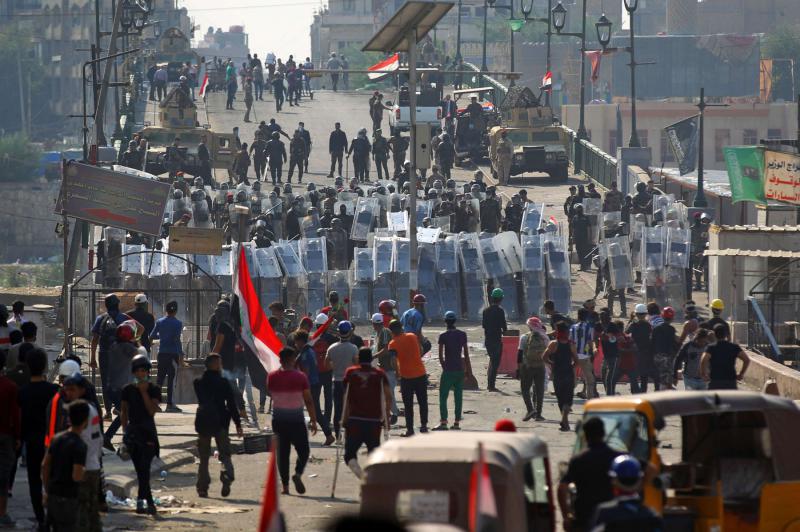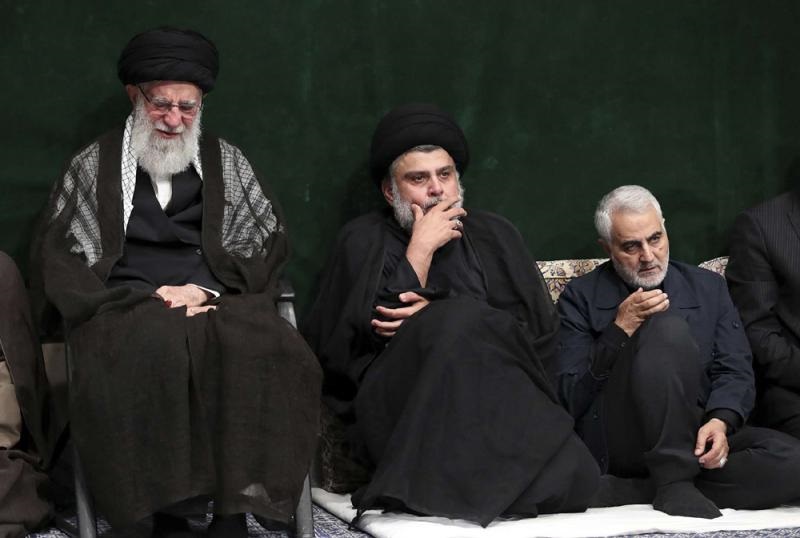
Iraqi anti-government protesters in Baghdad in 2019 (left). Photo: AP; Iraqi parliament (centre). File photo: AFP; Followers of Shiite cleric Muqtada al-Sadr in Baghdad in 2020 (right). Photo: AP; Graphic: Rudaw
All members of Iraq’s largest parliamentary bloc resigned from the legislature on Sunday following orders from their leader, Shiite cleric Muqtada al-Sadr, plunging the country into deeper political turmoil while increasing the risk of a new wave of civil unrest, eight months after the country held early elections in response to widespread demonstrations in 2019.
Sadr had been hinting at withdrawing from parliament for a while, but given that he led the largest parliamentary bloc, many thought it unlikely to occur.
In a televised address on Thursday, Sadr urged his MPs to "prepare their resignation papers to submit to the parliament presidency in the coming days," but this still seemed as a threat that would not be put into action.
That was until he asked Hassan al-Athari, head of the Sadrist bloc, in a letter obtained by Rudaw English on Sunday, to hand in the resignation of the bloc’s 73 MPs to the speaker of the parliament.
Soon enough, it had all become a reality. A video published by Iraqi state media soon after Sadr’s letter was sent depicted Athari handing in the resignation papers to Sadr’s Sunni ally, Parliament Speaker Mohammed al-Halbousi, with the latter signing the documents and approving the withdrawal of the Sadrist MPs.
When the country headed to the election polls in October, the aim of holding early elections was to form a government that would fulfill the demands of the thousands of protesters who took to the streets of Baghdad and several southern provinces in 2019, forcing then prime minister Adil Abdul-Mahdi to resign.
However, eight months later, the new parliament failed to elect a new president of the republic on three different occasions, therefore unable to elect a prime minister and a new government.
The inability to select a president has been attributed to disagreements over a candidate between the Patriotic Union of Kurdistan (PUK) and the Kurdistan Democratic Party (KDP), given that according to a long-standing customary agreement, the presidency lies with the Kurds.
Shiite parties were also split into two. The Sadrists insisted on forming a national majority government that would exclude the Iran-backed Coordination Framework, an alliance consisting Shiite parties close to Tehran. On the other hand, the Coordination Framework pushed for a consensus government, a system that Iraq has abided by since the US invasion of the country in 2003.
Over the past eight months, what Sadr was doing was a show of dominance, offering different blocs of the parliament opportunities to form a new government, knowing very well that they will not be able to do so.
The mass Sadrist parliamentary exodus may give their political rivals the chance of forming a consensus government, but this will likely be met with opposition from the Iraqi street, and while Sadr may no longer participate in parliament, thousands of his supporters across the country will be ready to flood the streets in a heartbeat if he calls on them to do so.
What is next?
According to information obtained by Rudaw English, in case of a legislator’s resignation, the candidate with the highest vote who did not win a seat in that specific constituency will replace them in the parliament, but a whole parliamentary bloc resigning at once is unprecedented.
To some, Sadr has started a new movement in the Iraqi political process.
“It is not clear, as to the end game of Muqtada al-Sadr, it is the first time since 2006 that the Sadrist movement is not represented in the Parliament and that can be regarded as a new era in Iraqi politics,” analyst and chairman of the Iraq Advisory Council Farhad Alaaldin told Rudaw English on Monday.
It is questionable if parliament will continue without the Sadrist bloc, but according to a PUK MP, whose party sides with the Coordination Framework and against what used to be a Sadrist-led coalition with the KDP and the Sunni Sovereignty alliance, believes that the dissolution of the parliament is really farfetched.
“I do not think that the dissolution of the parliament and once again arranging early elections is the solution given Iraq’s circumstances and political deadlock,” Dilan Ghafur told Rudaw English. “It might be a solution on some level, but I think it is really farfetched, results will not be much different anyway, and we will fall into the same process again.”
The Sadrist withdrawal opens up a number of possibilities as to where the Iraqi political process is headed next.
“The Sadrist movement turns from the largest parliamentary bloc that holds the political scene into a popular opposition movement with the absence of any parliamentary representation,” Alaaldin said in a tweet on Monday.
Alaaldin believes that the new Sadrist movement will demand for regime change after the Coordination Framework takes on as the largest parliamentary bloc, and will enter negotiations with the Kurdish and Sunni parties, but how the regime will change is still unclear, and a similar scenario to 2019 is not very far from happening.
However, despite what seems to be a brighter and easier path for the Coordination Framework to form a government, Research Associate at Chatham House, Hayder al-Shakeri told Rudaw on Monday that Sadr will still remain a strong political actor.
“The mass resignation of Sadrist MPs may appear to be a good occasion for the Coordination Framework to form a government, but Sadrists will continue to play an important part in the political process. If not in the parliament, then through their affiliates within the civil service or mobilizers in the streets,” he said.
Mass protests
While Sadr is often known to the public as someone with an unpredictable nature, he is also very much known for being a populist leader with a massive unshaken support base.
In January 2020, tens of thousands of Sadr supporters and members of Iraq’s pro-Iran parties and militias marched in Baghdad to demand the expulsion of US forces after Sadr blew the whistle of a “million-strong” march in response to the US drone strike that killed Iranian General Qasem Soleimani and Iraqi militia chief Abu Mahdi al-Muhandis.
The leader has on several other occasions called on his supporters to take the streets, which was enough to gather thousands of his followers.
But Sadr is not the most favored person when it comes to anti-government protests.
During the 2019 protests, Sadr at times would express his support for the protestors, but in January 2020, he officially withdrew his support for the anti-government protests, causing public outrage, a month later, he once again expressed his support for the protests.

According to Alaaldin, one of the possible scenarios that could play out in Iraq is that “the framework's efforts to form a new government may succeed, and the Sadrist popular movement continues in the political arena, with the clash continuing in the streets.”
“A repetition of what happened in October 2019 and the violence that accompanied the demonstrations and the entry of foreign parties to ride the wave cannot be ruled out,” Alaaldin said.
Shakeri also believes that protests are likely to happen, and could even lead to violence.
“If the situation does not improve with the provision of basic services and adequate solutions for the unemployed, protests are likely,” Shakeri said.
“Some political elite, on the other hand, is prone to try and seize the streets and demonstrators' demands. Furthermore, the intra-political rivalry will persist; we have seen small-scale assassinations and attacks, which may become more common if divisions persist and no agreements are reached,” he added.
Militia violence
Despite speaking against the presence of militias in the country during his election campaign and when attempting to form a government, he himself is not without the support of a militia.
Sadr founded southern Iraq’s Mahdi Army in 2003 which killed and injured scores of US servicemen.
He disbanded the militia in 2008. However, he announced the reactivation of the Mahdi Army after Soleimani's death, referring to himself as the “head of Iraqi National Resistance.”
Sadr’s Saraya al-Salam militia, known as the ‘blue hats’ for their distinctive headwear, have participated in several protests, at times supporting anti-government protestors, but other times accused of crackdown and persecution of protestors.
During the 2019 protests, Sadr’s blue hats attempted to seize control of the movement, occupying public spaces previously held by the protesters, including the iconic ‘Turkish Restaurant’ tower next to Baghdad’s Tahrir Square.
The unfinished building overlooking Tahrir Square had been held by the protesters for several months, becoming an icon of the movement, decorated with slogans demanding jobs, services, an end to corruption, and the overthrowing of the post-2003 political order.
Several protestors at the time recalled having faced threats and persecution from Sadr’s blue hats in the process.
Though it is not only the Sadrist side that are popular for violence. Iran backed militias have on several occasions opened fire on protestors.
But Head of the Iran backed Popular Mobilization Forces (PMF) Falih al-Fayadh on Monday reiterated “the PMF will not side with any political party and will not partake in any political fight.”
An Iran-backed government
Leaders of the Coordination Framework held a closed, yet crucial and urgent meeting on Monday following Sadr’s decision.
Sadr’s withdrawal from the parliament, regardless of the protest and political unrest it could cause, would also pave the way for the Framework to form a consensus government.
Sadr’s candidate for the premiership, Mohammed Jafaar al-Sadr, on Monday announced his withdrawal from the premiership race, saying “it is time to apologize and withdraw.”
Sadr’s top allies in parliament already expressed their respect for his decision.
“We respect the decision of his Eminence Sayid Muqtada al-Sadr, and we will follow up on subsequent developments,” KDP leader Masoud Barzani tweeted on Monday.
Parliamentary speaker Halbousi also took to Twitter, saying that they had made several efforts to discourage Sadr from withdrawing, “but he preferred to be a sacrifice and not a crippling cause; for the sake of the country and the people, he decided to proceed with this decision.”
Despite his anti-Iranian sentiments, Sadr has on occasions been accused of being pro-Iran, especially by protestors in 2019, claiming that he “betrayed” the protestors and served Iran’s interests.
He himself has never been a foe of Iran. In 2019, Sadr celebrated the Shiite holy day of Ashura in Iran, sitting between Iran’s Supreme Leader Ayatollah Khamenei and Soleimani.

Sadr’s decision leaves the future unclear
“If Parliament is dissolved and we go to early elections and it has become a great possibility, the traitor of the covenant and the promise and the treacherous imbecile will not sit again on the chair that he took by trick and heavy false faith,” senior member of the Sunni Sovereignty alliance Mashaan al-Juboori said on Monday.
But despite Sadr’s allies using a rough language, the coming days will clarify what Iraq’s faith will be, according to Shakeri.
“The following few days will reveal how the government formation process will unfold; a new government is yet possible. However, the issue is how long that government will be in power. Is it better to establish a new government right now? Or hold new elections and maintain Kadhimi's caretaker administration in place for the time being?” he said.








Comments
Rudaw moderates all comments submitted on our website. We welcome comments which are relevant to the article and encourage further discussion about the issues that matter to you. We also welcome constructive criticism about Rudaw.
To be approved for publication, however, your comments must meet our community guidelines.
We will not tolerate the following: profanity, threats, personal attacks, vulgarity, abuse (such as sexism, racism, homophobia or xenophobia), or commercial or personal promotion.
Comments that do not meet our guidelines will be rejected. Comments are not edited – they are either approved or rejected.
Post a comment